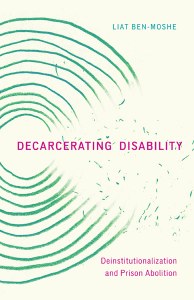Black Agenda Report Book Forum with Liat Ben-Moshe
 I want readers to understand that disability and mental health difference are not deficits and they are not only medical diagnoses. For people who are politicized as disabled, mad or neurodiverse – these categories are forms of identity and culture. There are histories, movements and cultural production attached to these categories. There is ableism, sanism and their connection to other interlocking systems of oppression, but these histories are also imbued with the resiliency and resistance of disabled/mad/neurodiverse people. (Ableism is oppression based on disability or impairment (real or perceived) and sanism is oppression of people with mental health difference and the mandate to be sane.) This history and culture is something we have to learn, even as disabled people, and sanism/ableism and pathologizing these categories is something we all need to un-learn.
I want readers to understand that disability and mental health difference are not deficits and they are not only medical diagnoses. For people who are politicized as disabled, mad or neurodiverse – these categories are forms of identity and culture. There are histories, movements and cultural production attached to these categories. There is ableism, sanism and their connection to other interlocking systems of oppression, but these histories are also imbued with the resiliency and resistance of disabled/mad/neurodiverse people. (Ableism is oppression based on disability or impairment (real or perceived) and sanism is oppression of people with mental health difference and the mandate to be sane.) This history and culture is something we have to learn, even as disabled people, and sanism/ableism and pathologizing these categories is something we all need to un-learn.
In addition, I hope that disability rights movements understand how pathologization is deeply connected to racialization, criminalization and white supremacy. I hope that this unlearning leads to more intersectional analysis and struggles for liberation.
Full interview with Liat Ben-Moshe, author of Decarcerating Disability, at Black Agenda Report.



